Rapunzel
"Rapunzel" (/rəˈpʌnzəl/; German pronunciation: [ʁaˈpʊnt͡səl]) is a German fairy tale in the collection assembled by the Brothers Grimm, and first published in 1812 as part of Children's and Household Tales. The Grimm Brothers' story is an adaptation of the fairy tale Rapunzel by Friedrich Schulz published in 1790. The Schulz version is based on Persinette by Charlotte-Rose de Caumont de La Force originally published in 1698 which in turn was influenced by an even earlier tale, Petrosinella by Giambattista Basile, published in 1634. Its plot has been used and parodied in various media and its best known line ("Rapunzel, Rapunzel, let down your hair") is an idiom of popular culture. In volume I of the 1812 annotations (Anhang), it is listed as coming from Friedrich Schulz Kleine Romane, Book 5, pp. 269–288, published in Leipzig 1790.
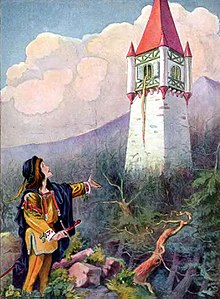

The Wolf and the Seven Young Goats
"The Wolf and the Seven Young Goats" (German: Der Wolf und die sieben jungen Geißlein) is a fairy tale collected by the Brothers Grimm, tale number 5. It is Aarne-Thompson type 123, but has a strong resemblance to The Three Little Pigs and other Aarne-Thomspson type 124 folktales, and to the variant of Little Red Riding Hood that the Grimms collected, where she is rescued.

Brothers Grimm
The Brothers Grimm (die Brüder Grimm or die Gebrüder Grimm), Jacob (1785–1863) and Wilhelm Grimm (1786–1859), were German academics, philologists, cultural researchers, lexicographers and authors who together specialized in collecting and publishing folklore during the 19th century. They were among the best-known storytellers of folk tales, and popularized stories such as "Cinderella" ("Aschenputtel"), "The Frog Prince" ("Der Froschkönig"), "The Goose-Girl" ("Die Gänsemagd"), "Hansel and Gretel" ("Hänsel und Gretel"), "Rapunzel", "Rumpelstiltskin" ("Rumpelstilzchen"),"Sleeping Beauty" ("Dornröschen"), and "Snow White" ("Schneewittchen"). Their first collection of folk tales, Children's and Household Tales (Kinder- und Hausmärchen), was published in 1812.


Little Red Riding Hood
"Little Red Riding Hood", or "Little Red Ridinghood", also known as "Little Red Cap" or simply "Red Riding Hood", is a European fairy tale about a young girl and a Big Bad Wolf. Its origins can be traced back to the 10th century by several European folk tales, including one from Italy called The False Grandmother (Italian: La finta nonna), later written among others by Italo Calvino in the Italian Folktales collection; the best known versions were written by Charles Perrault and the Brothers Grimm. The story has been changed considerably in various retellings and subjected to numerous modern adaptations and readings. It is number 333 in the Aarne-Thompson classification system for folktales. Variations of the story have developed, incorporating various cultural beliefs and regional dialects into the story. An example of this is "Kawoni's Journey Across the Mountain: A Cherokee Little Red Riding Hood", which introduces Cherokee myths and language into the traditional story. Another such example is "Petite Rouge Riding Hood", which approaches the story from a Cajun perspective.

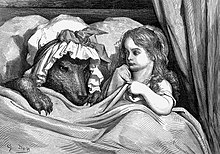
Seoul National University
Seoul National University (SNU; Korean, 서울대학교, Seoul Daehakgyo, colloquially Seouldae) is a national research university located in Seoul, South Korea, and was founded in 1946. Seoul National University is widely considered to be the most prestigious university in the country.
It is located on three campuses: the main campus is in Gwanak and two additional campuses in Daehangno and Pyeongchang. The university comprises sixteen colleges, one graduate school, and nine professional schools. The student body consists of nearly 17,000 undergraduate and 11,000 graduate students. According to data compiled by KEDI, the university spends more on its students per capita than any other university in the country that enrolls at least 10,000 students.

Harvard University
Harvard University is a private Ivy League research university in Cambridge, Massachusetts, established in 1636, whose history, influence, and wealth have made it one of the world's most prestigious universities.

Ivy League
The Ivy League is a collegiate athletic conference comprising sports teams from eight private institutions of higher education in the Northeastern United States. The conference name is also commonly used to refer to those eight schools as a group beyond the sports context. The eight institutions are Brown University, Columbia University, Cornell University, Dartmouth College, Harvard University, the University of Pennsylvania, Princeton University, and Yale University. The term Ivy League has connotations of academic excellence, selectivity in admissions, and social elitism.

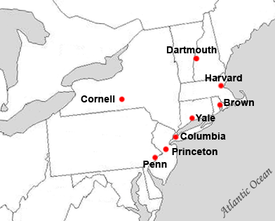
To the Virgins, to Make Much of Time
"To the Virgins, to Make Much of Time" is a poem written by English Cavalier poet Robert Herrick in the 17th century. The poem is in the genre of carpe diem, Latin for seize the day. It goes as follows:
- Gather ye rosebuds while ye may,
- Old Time is still a-flying;
- And this same flower that smiles today
- To-morrow will be dying.
- The glorious lamp of heaven, the sun,
- The higher he's a-getting,
- The sooner will his race be run,
- And nearer he's to setting.
- That age is best which is the first,
- When youth and blood are warmer;
- But being spent, the worse, and worst
- Times still succeed the former.
- Then be not coy, but use your time,
- And, while ye may, go marry:
- For having lost but once your prime,
- You may forever tarry.
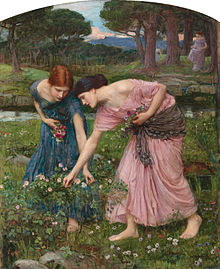
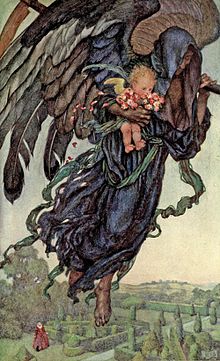
Carpe diem
Carpe diem is a Latin aphorism, usually translated "seize the day", taken from book 1 of the Roman poet Horace's work Odes (23 BC).
Carpe is the second-person singular present active imperative of carpō "pick or pluck" used by Horace to mean "enjoy, seize, use, make use of". Diem is the accusative case of the noun dies "day". A more literal translation of "carpe diem" would thus be "pluck the day [as it is ripe]"—that is, enjoy the moment.

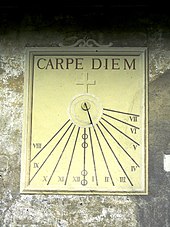
沒有留言:
張貼留言